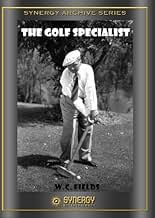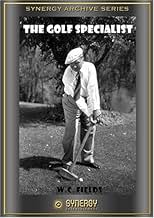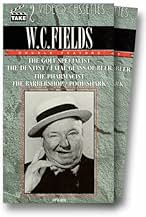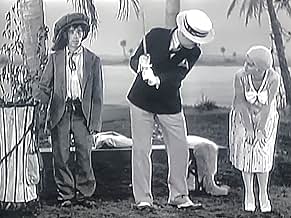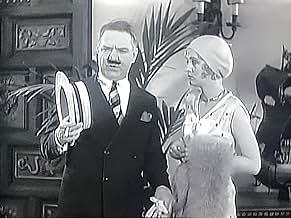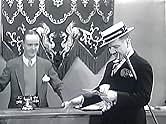AVALIAÇÃO DA IMDb
6,2/10
1,3 mil
SUA AVALIAÇÃO
Adicionar um enredo no seu idiomaJ. Effingham Bellweather plays golf despite many slapstick setbacks.J. Effingham Bellweather plays golf despite many slapstick setbacks.J. Effingham Bellweather plays golf despite many slapstick setbacks.
- Direção
- Roteirista
- Artistas
Allan Bennett
- Guest in Lobby
- (não creditado)
William Black
- Guest in Lobby with Letter
- (não creditado)
Naomi Casey
- Little Girl
- (não creditado)
John Dunsmuir
- Deep Sea McGurk - House Detective
- (não creditado)
Shirley Grey
- House Detective's Wife
- (não creditado)
Jack Irvin
- Deep Sea McGurk
- (não creditado)
Johnny Kane
- Walter - The Desk Clerk
- (não creditado)
Harriet E. MacGibbon
- Lady Walking Dog
- (não creditado)
Allen Wood
- The Caddy
- (não creditado)
Avaliações em destaque
W.C. Fields brightened up anything he was a part of. this twenty minute shortie is like a vaudeville bit. The house detective's wife flirts with the paying guests, and then waits for hubby to come along and chase him off. One of the hotel guests is J. Effington Bellweather (Fields). even his name is a naughty joke. wearing his typical straw hat, he apparently owes someone a ton of money, and tries to stay one step ahead. the women and girls in this bit all screech and scream... yeegods. then Fields goes into his physical comedy... slapstick humor with things sticking to shoes, shoes that squeak, and accidentally hitting things with a club. Gotta say, this is one of the more annoying bits by Fields... i usually LOVE his antics, but with the yelling, screaming, and un-inspired bits, can't rate this one as high as I usually do for Fields. Although the list of crimes he has committed is pretty funny, as the camera pans down the list. the opening music and picture are pretty messed up, since the tape is so old, but it clears up after a few minutes. this one is just SO-SO. Extra interesting as a bit of W.C. Fields' history, but some of the slapstick humor is a pretty dated at this point in time.
This is an early Fields treasure. While it lacked any sort of finish, it has moments that are very funny. We are first introduced to an attractive but lunkheaded woman who goes after every man she sees. She ends up on the links with Fields and we get a series of funny moments. But what has always cracked me up is the guy who plays the caddy, with his giant hat and his total cluelessness. What we have here is one pratfall after another. We must ask, "Will he ever hit the ball?"
This is an amusing short feature, and it holds up well for its time. You can tell at times that it is from the very early sound era, when they still did not quite have the pacing down, but W.C. Fields makes up for it with his usual skill at both sight gags and dialogue jokes. There have been few comedians as good as Fields was at getting good mileage out of a recurring line of dialogue ("keep your eye on the ball ... "), and here as "The Golf Specialist" he also gets quite a bit out of his peculiar caddie. The result is an entertaining trifle that is light on plot but that has some good laughs.
In this primitive early talkie W. C. Fields plays J. Effingham Bellweather, wanted by the authorities for eating spaghetti in public, explaining the facts of life to an Indian and other heinous crimes. Bewitched by the flirtatious wife of the detective in his hotel, Bellweather offers to display his prowess on the golf course to her with unexpected results.
Some of the early scenes in this film look like something from a spoof of badly-made films. There are some glaring continuity errors in the opening scene, and I'm sure I could hear a wind machine in operation in one scene on the golf course. Nevertheless this is quite a funny effort from Fields, whose performance benefits dramatically from the use of sound. I especially liked the scene in which he reads a note from an aggrieved debtor in front of the receptionist to whom the note was dictated. After reading it, Fields slowly and deliberately tears the note into pieces and, as he discards it, comments wryly "silly little girl." He also does battle with a smart little girl who literally screams all her lines with gusto, and makes good use of a number of props: exploding cigarette lighters, warped golf clubs, sheets of paper, squeaky shoes. The routine on the golf course wears a little thin, but is enlivened by the presence of a strange caddy who almost manages to upstage Fields on a number of occasions.
Some of the early scenes in this film look like something from a spoof of badly-made films. There are some glaring continuity errors in the opening scene, and I'm sure I could hear a wind machine in operation in one scene on the golf course. Nevertheless this is quite a funny effort from Fields, whose performance benefits dramatically from the use of sound. I especially liked the scene in which he reads a note from an aggrieved debtor in front of the receptionist to whom the note was dictated. After reading it, Fields slowly and deliberately tears the note into pieces and, as he discards it, comments wryly "silly little girl." He also does battle with a smart little girl who literally screams all her lines with gusto, and makes good use of a number of props: exploding cigarette lighters, warped golf clubs, sheets of paper, squeaky shoes. The routine on the golf course wears a little thin, but is enlivened by the presence of a strange caddy who almost manages to upstage Fields on a number of occasions.
From the very first moments of The Golf Specialist, W. C. Fields' talkie debut, it's apparent that we're watching a technically primitive effort that can't hold a candle to The Great Man's best comedies. It's comparable to the Marx Brothers' first film The Cocoanuts in a number of ways, from the stilted pacing and uncertain camera work right down to the obviously bogus "Florida" location that looks suspiciously like it was staged in a cramped and stuffy East Coast studio. But, as with the Marxes' debut, there are stretches when the comedy transcends the antiquated technique and you find yourself laughing anyhow. This film features a prolonged opening sequence in a hotel lobby (again reminiscent of The Cocoanuts) that lurches from bit to bit without ever finding a consistent comic rhythm, although there are some amusing moments. Some of the actors-- especially the old guy playing the sailor --are downright amateurish, and when Fields finally makes his entrance it comes as a relief. He's still wearing that icky little mustache he wore in his silent comedies, but it's good to see him anyway. Almost immediately he's confronted by a little girl with an annoyingly shrill voice, and their run-in serves as a dress rehearsal of sorts for Fields' many battles with obnoxious children yet to come.
Again like The Cocoanuts this film, despite its technical limitations, stands as a valuable record of a popular stage act of the Jazz Age, for the second half preserves Fields' famous golf routine. Variously known as "A Game of Golf" and "An Episode on the Links," the act was introduced in the Ziegfeld Follies of 1918 and is a set-piece of gradually mounting frustration. The act features Fields on the golf links simply trying to cue up and hit a ball while his lady friend watches. He is thwarted at every turn by distracting sounds, a misplaced pie, errant wrapping paper that somehow winds up in his mouth, the misbehavior of his golf clubs, and most of all by the bizarre little man who serves as his caddy. Fields used a portion of the act in his silent feature So's Your Old Man but it lost some of its punch in the silent medium, what with so much of the comedy depending on sudden noises. Here at least we get to hear the appropriate sound effects and savor Fields' quips and murmured ramblings, although personally I find his over-reliance on the phrase "Stand clear and keep your eye on the ball!" wearisome after awhile. But unsung leading lady Shirley Grey provides a boost with a number of amusingly delivered Dumb Dora remarks, while a comic named Al Woods is a hoot as Fields' oddball caddy.
Actress Louise Brooks was a dancer in the Follies in the mid-1920s when Fields revived his golf act and she used to watch him from the wings on a nightly basis. Brooks later said that the routine was never as funny in the movies as it was on stage. That surely must be so, but we can only imagine how much funnier it was when Fields was working off the response of a live audience. In any case, having this record of the act is better than nothing, and in the meantime viewers who find The Golf Specialist disappointing will want to take a look at Fields' underrated 1934 feature You're Telling Me!, which offers a more satisfying version of the golf routine than the one found here.
Again like The Cocoanuts this film, despite its technical limitations, stands as a valuable record of a popular stage act of the Jazz Age, for the second half preserves Fields' famous golf routine. Variously known as "A Game of Golf" and "An Episode on the Links," the act was introduced in the Ziegfeld Follies of 1918 and is a set-piece of gradually mounting frustration. The act features Fields on the golf links simply trying to cue up and hit a ball while his lady friend watches. He is thwarted at every turn by distracting sounds, a misplaced pie, errant wrapping paper that somehow winds up in his mouth, the misbehavior of his golf clubs, and most of all by the bizarre little man who serves as his caddy. Fields used a portion of the act in his silent feature So's Your Old Man but it lost some of its punch in the silent medium, what with so much of the comedy depending on sudden noises. Here at least we get to hear the appropriate sound effects and savor Fields' quips and murmured ramblings, although personally I find his over-reliance on the phrase "Stand clear and keep your eye on the ball!" wearisome after awhile. But unsung leading lady Shirley Grey provides a boost with a number of amusingly delivered Dumb Dora remarks, while a comic named Al Woods is a hoot as Fields' oddball caddy.
Actress Louise Brooks was a dancer in the Follies in the mid-1920s when Fields revived his golf act and she used to watch him from the wings on a nightly basis. Brooks later said that the routine was never as funny in the movies as it was on stage. That surely must be so, but we can only imagine how much funnier it was when Fields was working off the response of a live audience. In any case, having this record of the act is better than nothing, and in the meantime viewers who find The Golf Specialist disappointing will want to take a look at Fields' underrated 1934 feature You're Telling Me!, which offers a more satisfying version of the golf routine than the one found here.
Você sabia?
- CuriosidadesThe picture of Bellweather on the wanted poster shows W.C. Fields in costume for his "Fatal Glass of Beer" sketch. It obviously is taken from a stage presentation of the well-tried routine, as the comedian would not film it until 1933.
- Erros de gravaçãoWhen the paper from the pie are interfering with Bellweather's golf swing, the whirring sound of the fan blowing them can be heard clearly on the sound track.
- Citações
J. Effingham Bellweather: Don't stand there! Don't you know I'll smite you in the sconce with this truncheon?
- ConexõesEdited into W.C. Fields: 6 Short Films (2000)
- Trilhas sonorasHappy Days Are Here Again
(1929) (uncredited)
Music by Milton Ager
Lyrics by Jack Yellen
The first three words of the song is sung a cappella by W.C. Fields.
Principais escolhas
Faça login para avaliar e ver a lista de recomendações personalizadas
Detalhes
- Data de lançamento
- País de origem
- Idioma
- Também conhecido como
- Broadway Headliners: The Golf Specialist
- Locações de filme
- Empresa de produção
- Consulte mais créditos da empresa na IMDbPro
- Tempo de duração
- 20 min
- Cor
- Proporção
- 1.20 : 1
Contribua para esta página
Sugerir uma alteração ou adicionar conteúdo ausente

